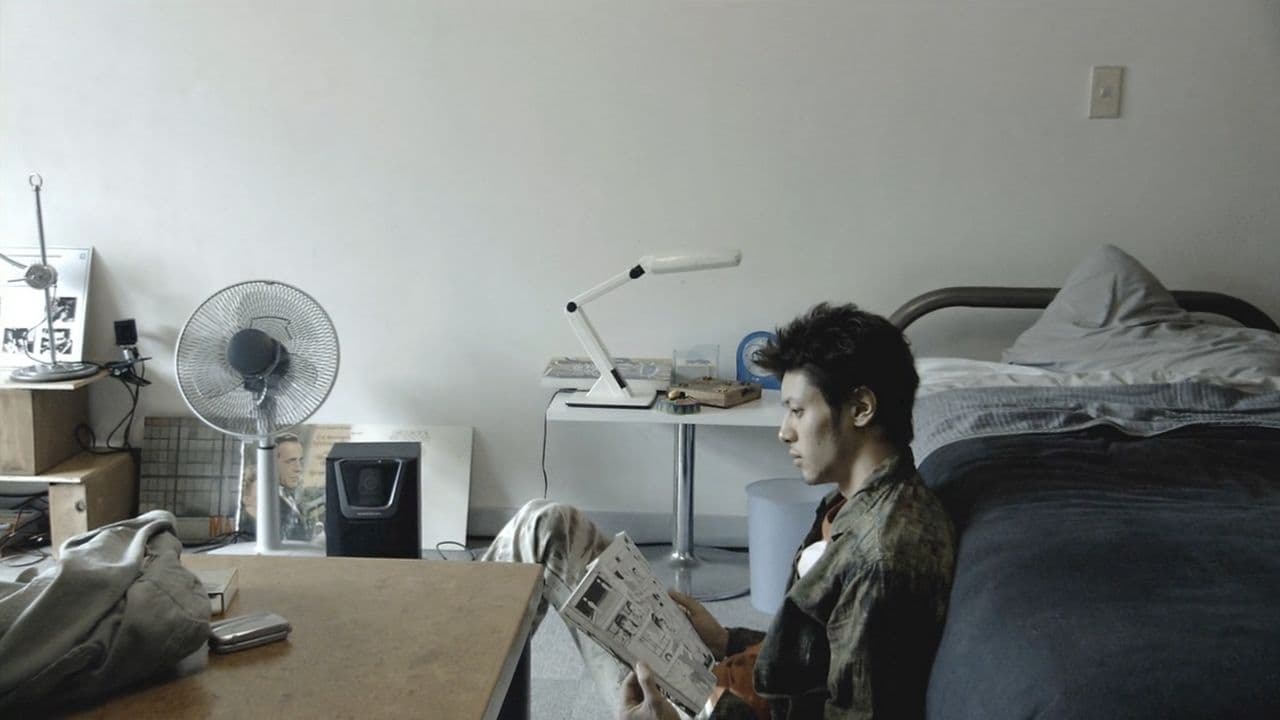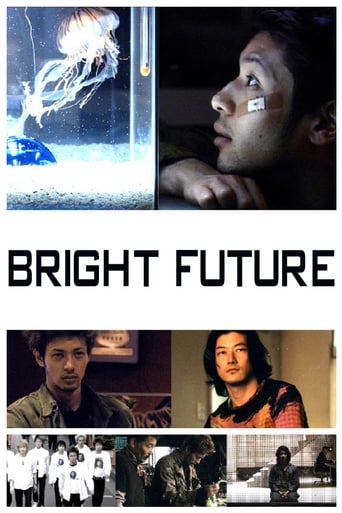Ketrivie
It isn't all that great, actually. Really cheesy and very predicable of how certain scenes are gonna turn play out. However, I guess that's the charm of it all, because I would consider this one of my guilty pleasures.
Mischa Redfern
I didn’t really have many expectations going into the movie (good or bad), but I actually really enjoyed it. I really liked the characters and the banter between them.
Claire Dunne
One of the worst ways to make a cult movie is to set out to make a cult movie.
Married Baby
Just intense enough to provide a much-needed diversion, just lightweight enough to make you forget about it soon after it’s over. It’s not exactly “good,” per se, but it does what it sets out to do in terms of putting us on edge, which makes it … successful?
danspag15
if your an American over 30 you won't get this unless you know about young Japanese culture. Likewise, if you are intelligent, and under this "age limit" you will get this movie. Its a real interesting expose about the aimlessness youth society has taken, I found the Jellyfish metaphor intriguing. The soft spoken characters urge you to want to know more about them, yet, at the same time, you begin to think you understand them. I have really become a fan of the more "intelligent" movies that japan has to offer as of lately (as opposed to the slasher and samurai movies), and they do not disappoint. If you enjoyed Kikujiro, you will like this movie, likewise if you enjoyed this movie, be sure to check out Kikujiro. While Akarui mirai is not the best film I have ever seen, it is defiantly something i would recommend.
Lawrence
Bright Future, another recent dark film from the great Japanese director Kiyoshi Kurosawa, focuses on working class folks whose future is anything but bright. The irony of the title is pounded home in scene after scene. Yuji and Mamoru, friends in their 20s who work at the same boring job in the same dull warehouse, are both frustrated with their lives. But there is a big difference. While Mamoru looks around carefully and gives Yuji knowing glances, and tells Yuji when to Wait and when to Go Ahead (capital letters used on purpose), Yuji is content to live in his dreams in which, he says in a voice-over, he sees himself as having a bright future. Mamoru has a pet poisonous jellyfish, which he bequeaths to Yuji when something terrible happens and Mamoru lands in prison. Their boss, a man of 55, is just as frustrated with his boring existence as his two workers, and Mamoru's father is, as well, a man who labors at a thankless job that keeps him confined to a small space; he fixes broken appliances in a salvage shop. When the jellyfish escapes from Yuji, he panics, then relaxes when he realizes that it is, in essence, following him wherever he goes. Kurosawa always fuses fantasy with reality in his films and this one is no exception. Although an obvious symbol for escape from a humdrum existence, the jellyfish turns out to be something more than that as well. This is brought home later in the film when we see a flotilla of the things moving out to sea in the Tokyo canal... KK, as I like to call him--to distinguish him from Akira Kurosawa--makes films like no one else today. It's easy and at the same time intriguing to read into his films more than what we see and chances are that the added meanings we find are right. I think we know this because his films resonate long after leaving the theater; the layers of meaning we find in them continue to make themselves apparent without much effort at all.Bright Future is a film about significantly more than people who spend their time, their lives in futile activity. It's about whether or not we think about how to live our lives, about whether we value the time that we have, or how we value it, if we do at all. It's about how we try to move beyond what we have and how that usually fails. It's a sad film but one that upon reflection makes us think that maybe there is, after all, a chance for a bright future. Or maybe not.
noralee
"Bright Future (Akarui mirai)" feels very much like a Sam Shephard play, with its themes of stifling fathers and rebelling sons and sibling responsibility between brothers, all suffused with irrational violence. There's even a continuing leitmotif of a cowboy Western musical riff when magic realism takes over from the unrelieved quotidian of men who work with the detritus of an almost post-apocalyptic-seeming society, from a laundry to an appliance recycling workshop, and condescended to by their biological and putative family members with more money and much nicer apartments.The characters seem to need to strike out with either Raskolnikov-ian or manipulative acts of violence as existential acts to affect their environment ("acclimating to Tokyo" is how one character metaphorically puts it) to be sure they're alive or having an impact on the living. The main characters, well-matched by Tadanobu Asano as the scarily manipulative brother figure and Jô Odagiri as his even more depressed acolyte, are so alienated that the rigid others around them assume they are developmentally disabled. I'm quite sure I didn't get anywhere near all the Goddard-ian symbolism, from the production design of the characters' seedy living arrangements to the phosphorescent beauty of poisonous jellyfish, which are used beyond the frogs in "Magnolia" in entrancing and haunting images like Conrad's fascination of the abomination. The conclusion seems hopeless in a clouded fade into "A Clockwork Orange"-like, thrill-seeking gang of aimless young men wearing Che T-shirts, with a brightly hypocritical pop song about the future playing on the soundtrack. I never knew that Tokyo had so many interesting bridges and canals. I haven't seen any other films written or directed by Kiyoshi Kurosawa to know if I just saw a bad print or if the washed out, almost black-and-white, fuzzy digital-video-seeming look was intentional.
sallyfifth
Akarui Mirai has a lot going for it. Somewhere in the mess of metaphor and "art for art's sake" is a good story with a strong message and good images. Unfortunately things get typically nonsensical with the lesser Kurosawa behind the camera. Ok, that's harsh, but why can't this guy find a way to tell his story coherently AND make use of the positive aspects of his style. I like art-house movies, I like esoteric Japanese dramas, I like quirky filmmaking, but I don't like this movie. It's the type of movie I dislike most in fact, it's a badly made film pretending to be a good one. I trusted it, and it basically took me for a ride to nowhere and left me there.
I admit, the movie has it's moments, the lyrical beauty of the Jellyfish, one of the movie's most powerful images, are wonderful. The performance of the leads is good. There's some humor sprinkled here and there, but for what reason? I couldn't read the tone of the movie... Is this a fariytale? Is it a drama? There's just so much jammed onto that screen, and yet nothing. It's basically a bunch of nice ideas, presented in an incredibly lifeless manner. I can't imagine who would find any of this fulfilling?

